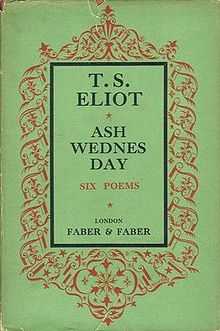Ash Wednesday (poem)

Ash Wednesday (sometimes Ash-Wednesday) is the first long poem written by T. S. Eliot after his 1927 conversion to Anglicanism. Published in 1930, this poem deals with the struggle that ensues when one who has lacked faith in the past strives to move towards God.
Sometimes referred to as Eliot's "conversion poem", Ash-Wednesday, with a base of Dante's Purgatorio, is richly but ambiguously allusive and deals with the move from spiritual barrenness to hope for human salvation. The style is different from his poetry which predates his conversion. "Ash-Wednesday" and the poems that followed had a more casual, melodic, and contemplative method.
Many critics were "particularly enthusiastic concerning 'Ash-Wednesday'",[1] while in other quarters it was not well received.[2] Among many of the more secular literati its groundwork of orthodox Christianity was discomfiting. Edwin Muir maintained that "'Ash-Wednesday' is one of the most moving poems he [Eliot] has written, and perhaps the most perfect."[3]
Publication information
The poem was first published as now known in April, 1930 as a small book limited to 600 numbered and signed copies. Later that month an ordinary run of 2000 copies was published in the UK, and in September another 2000 published in the US.
Eliot is known to have collected poems and fragments of poems to produce new works. This is most clearly seen in his poems "The Hollow Men" and "Ash-Wednesday" where he incorporated previously published poems to become sections of a larger work. Three of the five sections comprising "Ash-Wednesday" had already been published earlier as separate poems (years link to corresponding "[year] in poetry" articles):
- "Perch' Io non Spero" (part I of "Ash-Wednesday") was published in the Spring, 1928 issue of Commerce along with a French translation.
- "Salutation" (now part II of "Ash-Wednesday") was published in December, 1927 in Saturday Review of Literature. It was also published in January, 1928 in Eliot's own Criterion magazine.
- "Som de l'escalina" (part III of "Ash-Wednesday") was published in the Autumn, 1929 issue of Commerce along with a French translation.
(Publication information from Gallup[4])
Dedication
When first published, the poem bore the dedication "To my wife", referring to Eliot's first wife, Vivienne Haigh-Wood Eliot, with whom he had a strained relationship, and from whom he initiated a legal separation in 1933. The dedication does not appear in subsequent editions.[5]
References
- ↑ Untermeyer, Louis. Modern American Poetry pp. 395-396 (Harcourt Brace 1950)
- ↑ http://www.britannica.com/nobel/micro/190_21.html Britannica: Guide to the Nobel Prizes: Eliot, T.S. by Dame Helen Gardner and Allen Tate, accessed November 6, 2006.
- ↑ Untermeyer, Louis. Modern American Poetry p. 396 (Harcourt Brace 1950)
- ↑ Gallup, Donald. T. S. Eliot: A Bibliography (A Revised and Extended Edition) pp. 39-40, 218, 219, 223 (Harcourt Brace & World 1969)
- ↑ Seymour-Jones, Carole. Painted Shadow. Doubleday 2001, p. 4.
External links
- Ash-Wednesday on msgr.ca
- Commentary on Ash-Wednesday from A Noble Theme
- Full poem written and audio by Eliot (14 mins), On Being (Public Radio)
| ||||||||||||||||||||||||||||||||||||||||||||||
